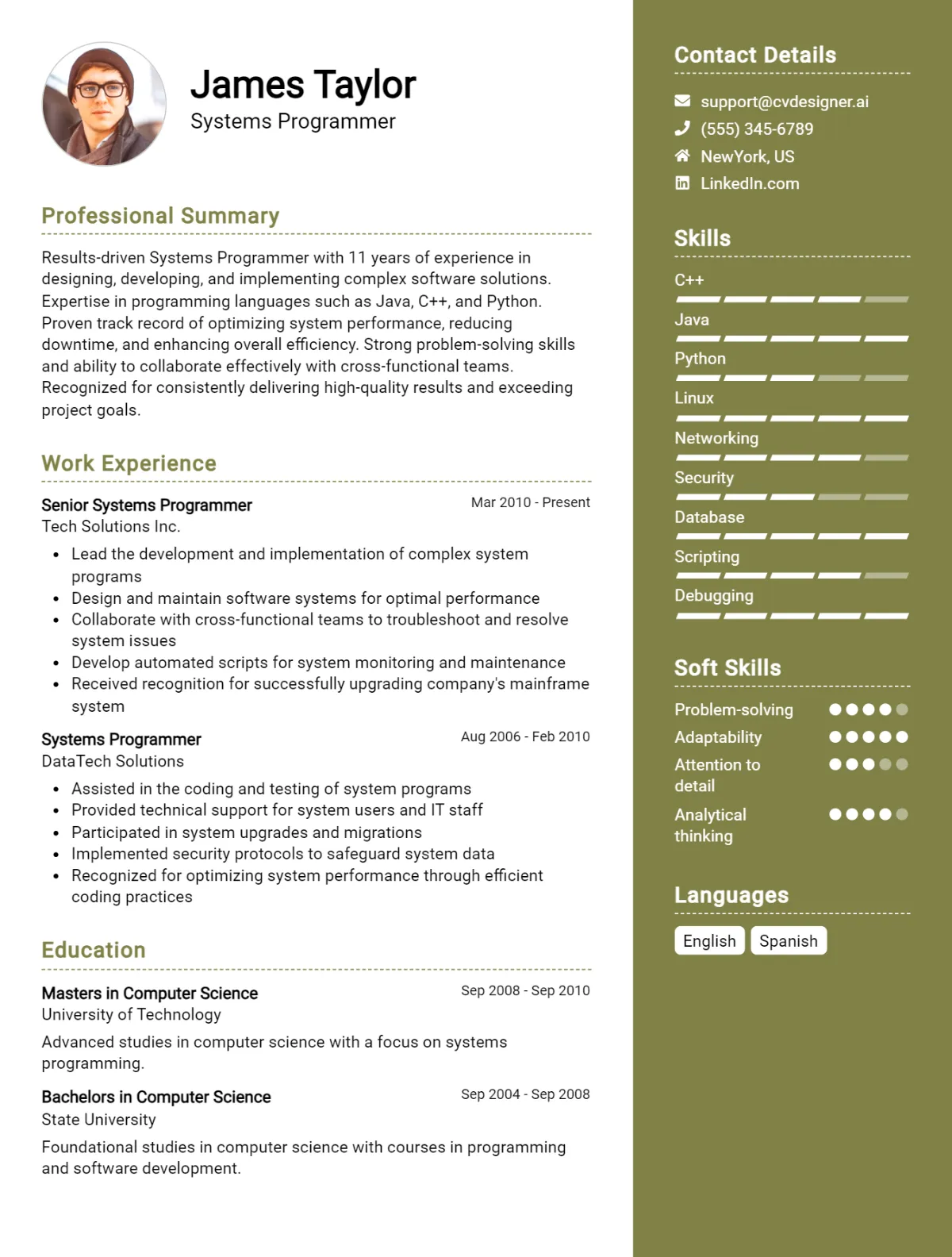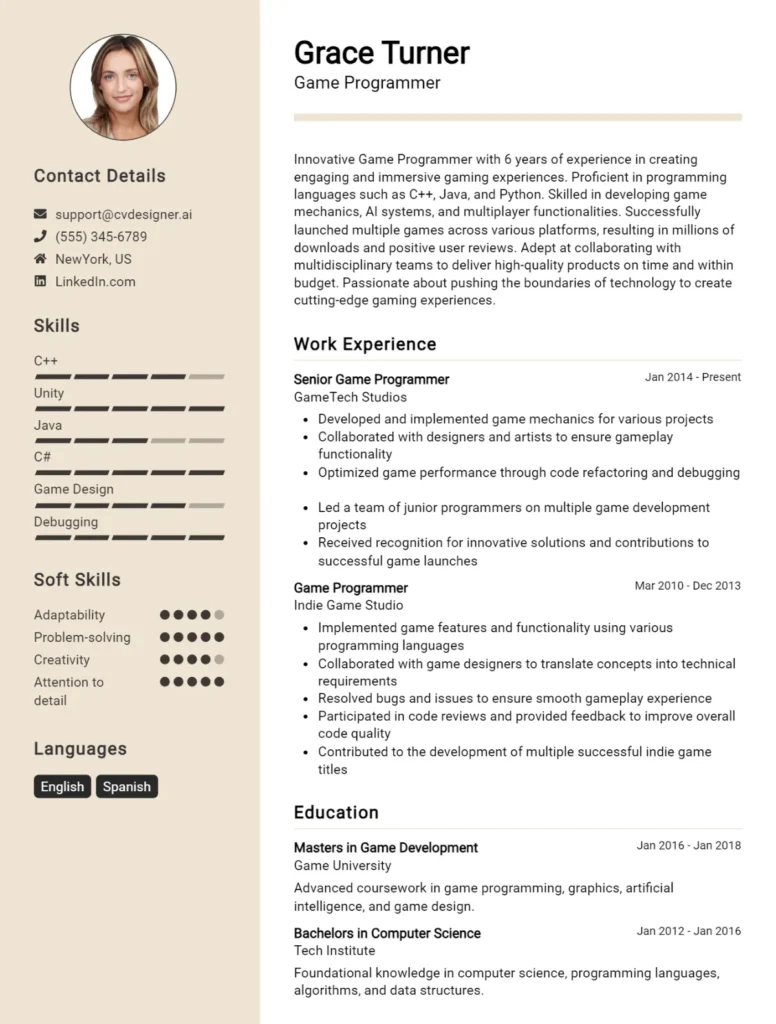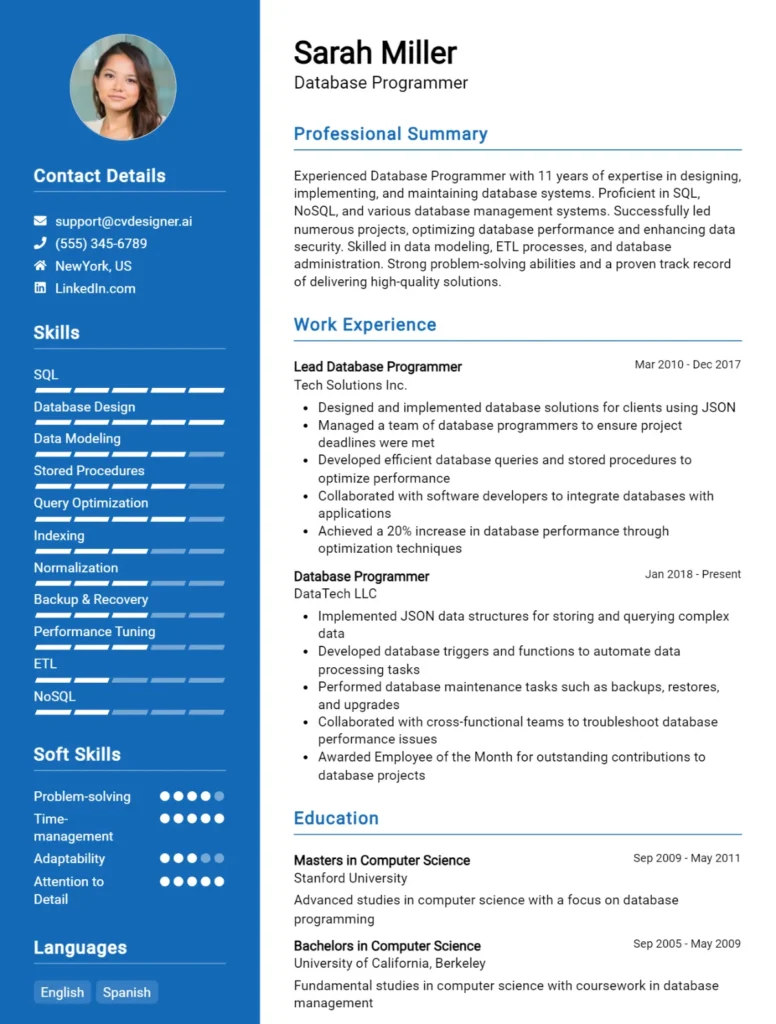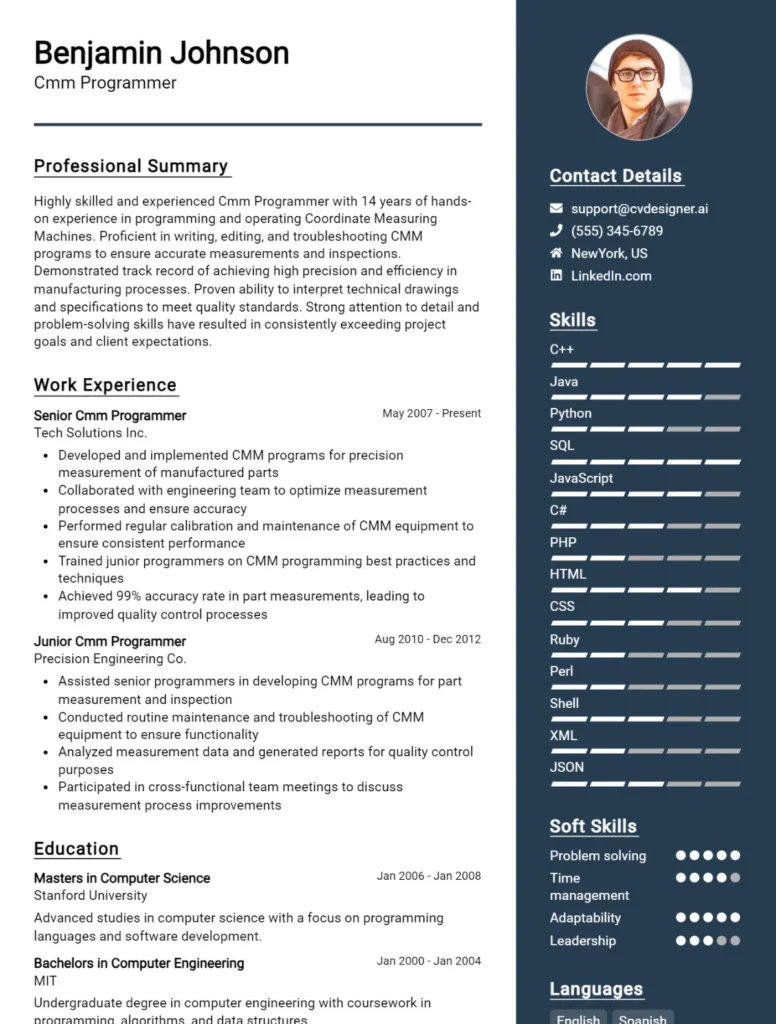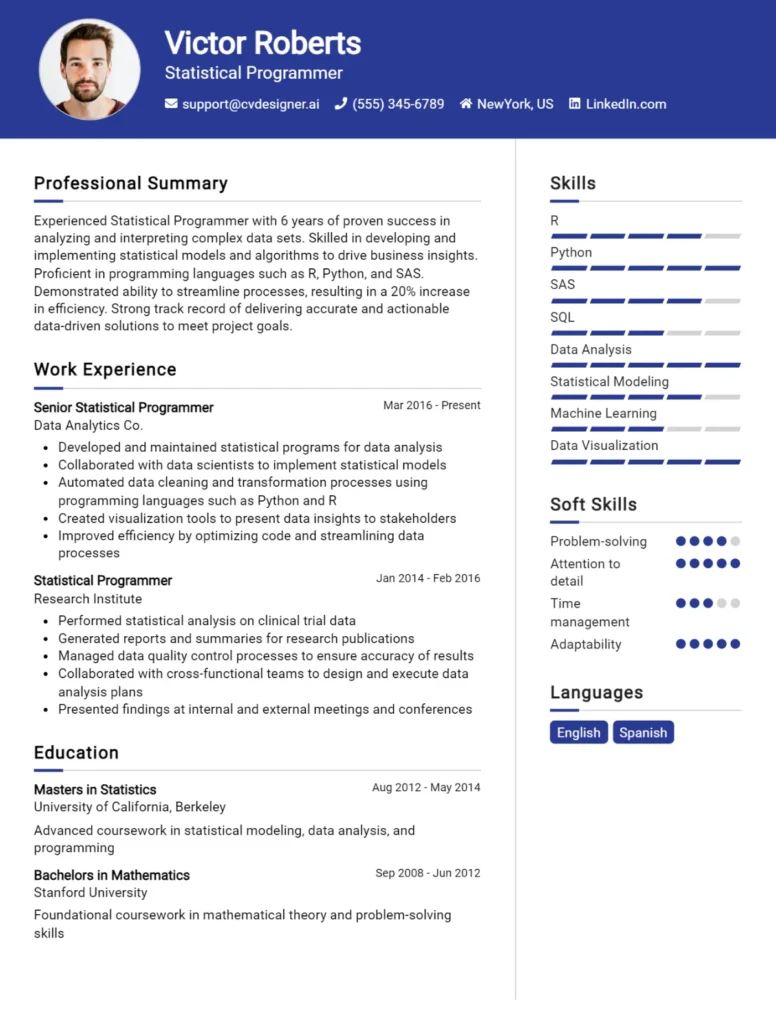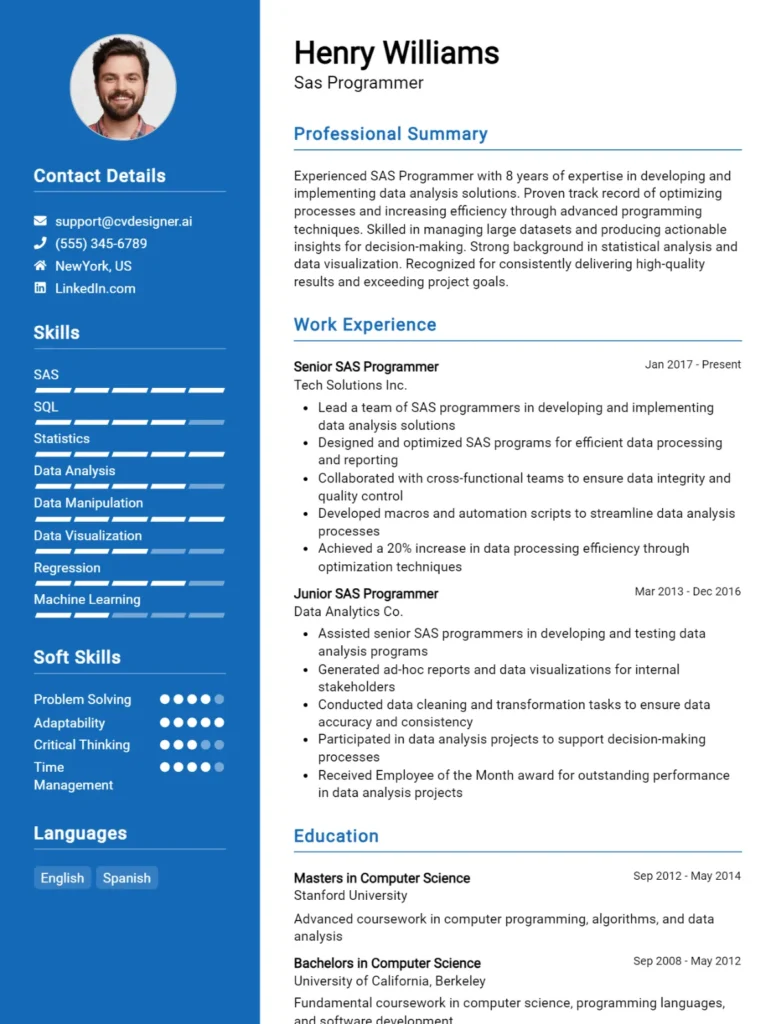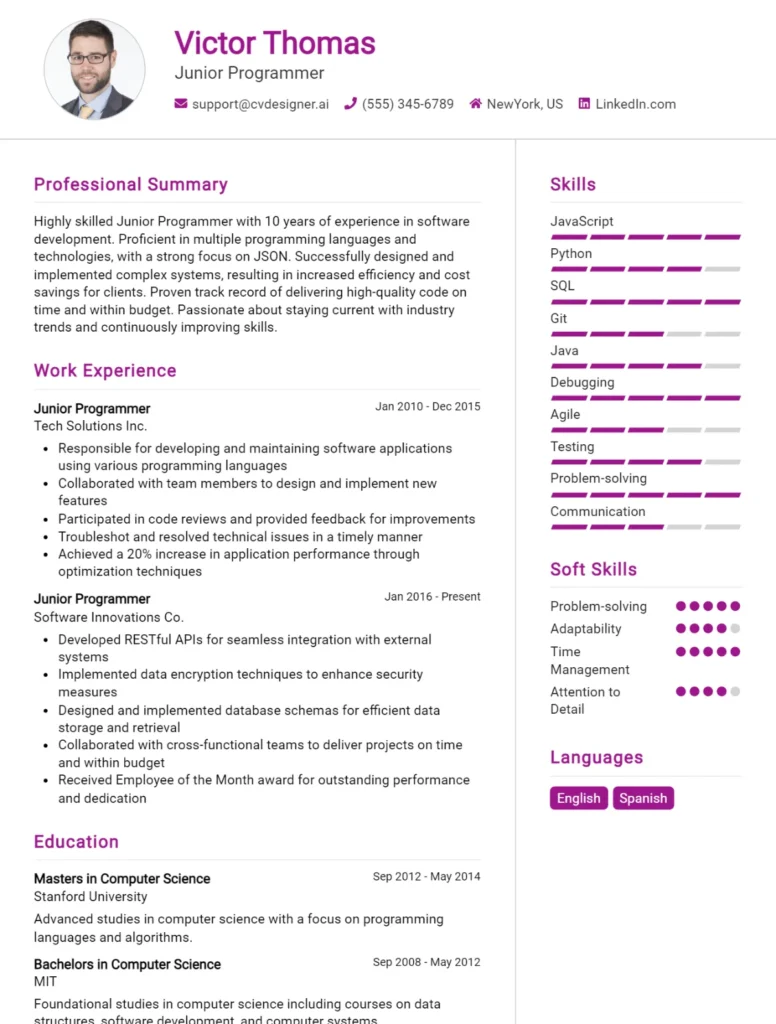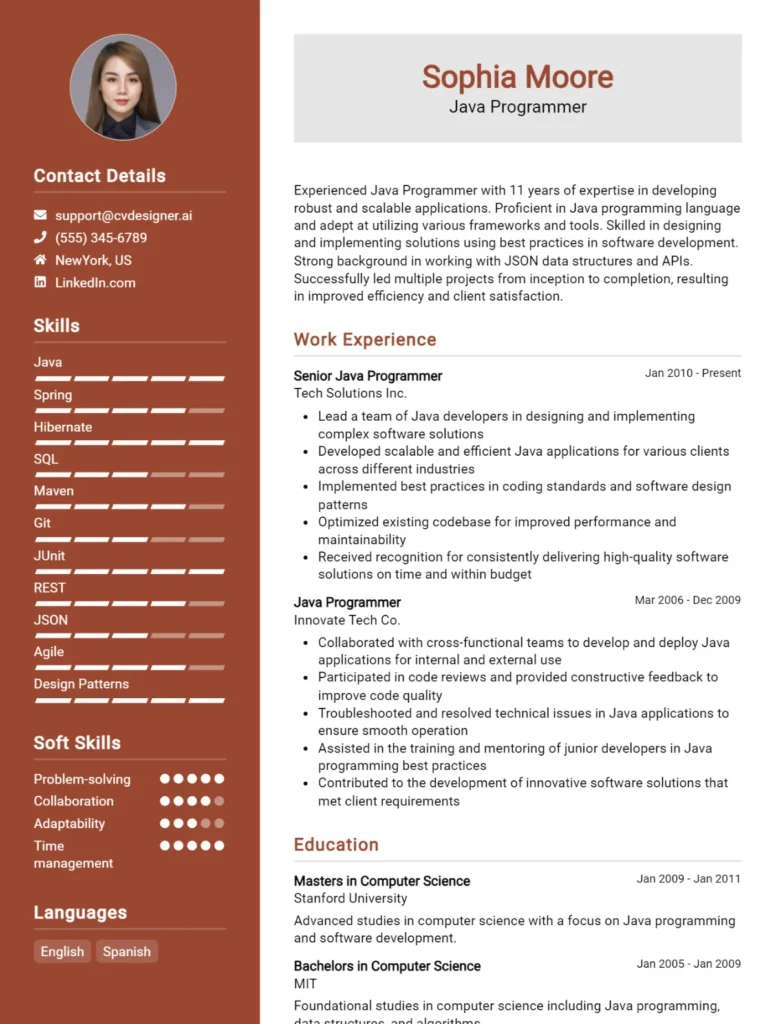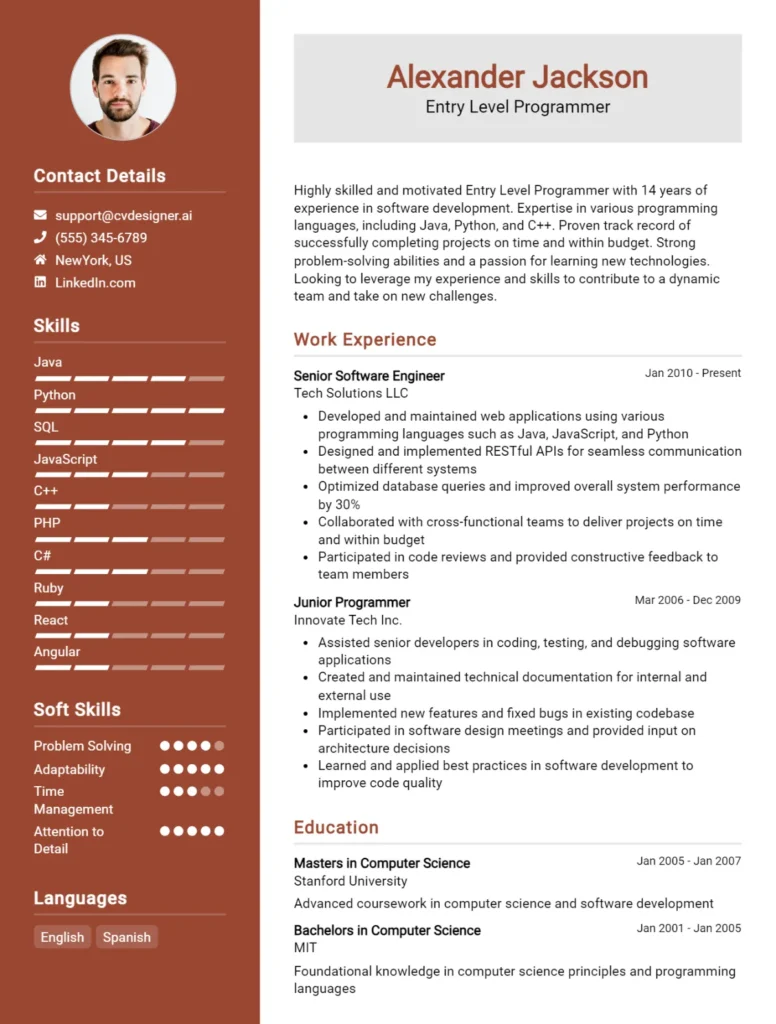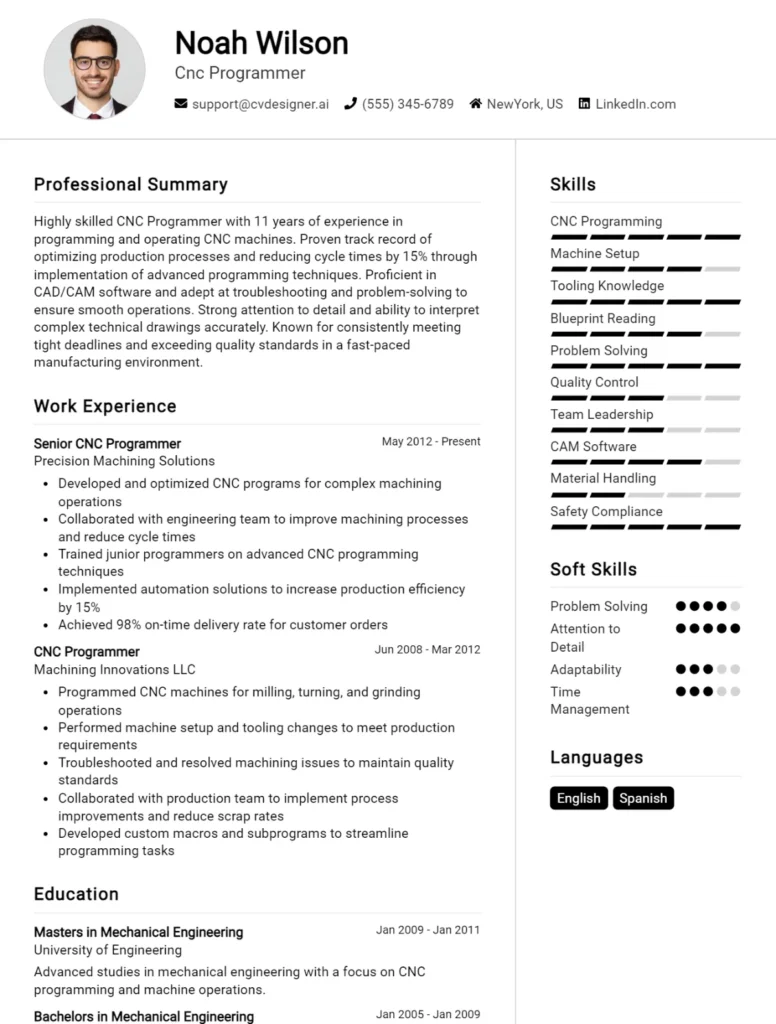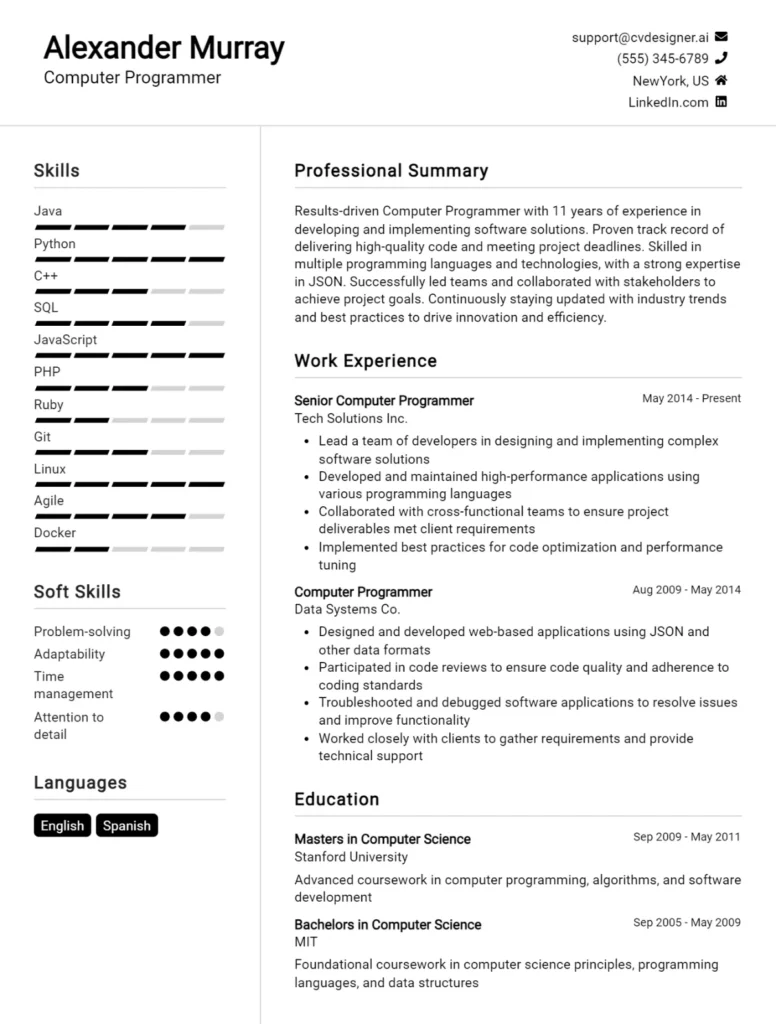Most Popular Systems Programmer CV Examples
Explore additional Systems Programmer CV samples and guides and see what works for your level of experience or role.
As the backbone of any technological infrastructure, Systems Programmers play a crucial role in developing, maintaining, and optimizing system software that underpins applications and services. Crafting a compelling CV for this specialized role is essential to stand out in a competitive job market. In this comprehensive guide, we'll walk you through the key elements of writing an impressive Systems Programmer CV that showcases your technical skills and experiences effectively. By the end of this article, you will be equipped with practical tips, a structured CV example, and insights into what employers are looking for. Here’s what you can expect to learn:
- The fundamental components of a Systems Programmer CV
- How to highlight your technical skills and programming languages effectively
- Tips for showcasing your relevant experience and projects
- The importance of including certifications and ongoing education
- Strategies for tailoring your CV to specific job descriptions
- Common pitfalls to avoid while writing your CV
Dive in to discover how to create a standout CV that opens doors to your next career opportunity as a Systems Programmer!
What is a Systems Programmer CV?
A Systems Programmer CV is a crucial document that showcases an individual's technical expertise, programming skills, and experience in systems-level programming. This role typically involves developing, maintaining, and optimizing systems software, which is essential for ensuring that hardware and software components work efficiently together. A well-crafted CV highlights not only the candidate's proficiency in various programming languages and tools but also their understanding of operating systems, hardware interfaces, and performance optimization techniques. For tips on how to create an effective CV, refer to our comprehensive cv writing guide.
In addition to showcasing technical skills, a Systems Programmer CV serves as a marketing tool that can differentiate a candidate in a competitive job market. It should detail relevant work experiences, projects, and accomplishments that demonstrate the candidate's ability to solve complex problems and contribute to the organization’s goals. Utilizing a professional cv maker can help streamline the process, enabling candidates to present their qualifications in a polished and visually appealing format. This not only increases the chances of landing an interview but also reflects the candidate's commitment to professionalism in their field.
Key Components of a Systems Programmer CV
- Contact Information: Include your full name, phone number, email address, and LinkedIn profile if applicable. Make sure this information is up to date.
- Professional Summary: A brief overview of your experience, skills, and what you bring to the role of a Systems Programmer. Tailor this section to highlight your key strengths.
- Technical Skills: List relevant programming languages (e.g., C, C++, Python), operating systems (e.g., Linux, Windows), and tools you are proficient in. For a comprehensive list of skills, you can refer to skills.
- Work Experience: Detail your previous roles, focusing on your responsibilities and achievements as a Systems Programmer. Highlight specific projects or key contributions. For guidance on structuring this section, visit work experience.
- Education: Include your degrees, major, institution, and graduation dates. Consider adding any relevant coursework that pertains to systems programming.
- Certifications: Mention any relevant certifications, such as CompTIA A+, Certified Software Development Professional (CSDP), or any specific systems programming certifications.
- Projects: Describe notable projects you've worked on, particularly those that demonstrate your systems programming skills. Include details about your role and the technologies used.
- Professional Affiliations: List memberships in professional organizations, such as the Association for Computing Machinery (ACM) or IEEE Computer Society, which can showcase your commitment to the field.
- Publications and Presentations: If applicable, include any relevant papers, articles, or presentations you've delivered. This can help establish your expertise in systems programming.
- Soft Skills: Highlight important soft skills such as problem-solving, teamwork, and communication, which are essential for collaborating with other developers and stakeholders.
- References: State that references are available upon request, or include them if you have permission from your references to share their contact information.
- Additional Information: Include any other relevant information that may strengthen your application, such as language proficiencies, volunteer work, or personal projects related to systems programming.
Sample Systems Programmer CV for Inspiration
John Doe
123 Main Street
Cityville, ST 12345
(123) 456-7890
johndoe@email.com
LinkedIn: linkedin.com/in/johndoe
Professional Summary
Detail-oriented and dedicated Systems Programmer with over 7 years of experience in software development and systems integration. Proficient in designing, developing, and implementing complex systems solutions, with a strong focus on performance optimization and security. Demonstrated ability to collaborate with cross-functional teams to enhance system functionality and user experience. Committed to continuous learning and applying innovative technologies to improve organizational efficiency.
Work Experience
Systems Programmer
Tech Innovations Inc., Cityville, ST
June 2020 – Present
- Developed and maintained high-performance system applications using C++, Java, and Python, leading to a 30% increase in processing speed.
- Collaborated with system architects to design scalable systems while optimizing existing software for enhanced performance and reliability.
- Implemented automated testing procedures which reduced bug tracking time by 25%, ensuring smooth deployment of software updates.
- Led a team of developers in a project to migrate legacy systems to cloud-based solutions, improving system accessibility and reducing costs by 15%.
Junior Systems Programmer
NextGen Solutions, Cityville, ST
August 2017 – May 2020
- Assisted in the development of middleware solutions to facilitate communication between different software applications, improving data exchange efficiency.
- Participated in troubleshooting and debugging of system issues, successfully resolving 90% of reported problems within the first 48 hours.
- Contributed to the documentation and training of end-users on new system functionalities, enhancing user satisfaction and reducing support requests.
- Engaged in code reviews and contributed to team knowledge-sharing sessions, fostering a collaborative learning environment.
Intern Systems Programmer
Innovative Tech Labs, Cityville, ST
June 2016 – July 2017
- Supported the development team in coding and testing software applications, gaining hands-on experience in programming languages such as C# and Ruby.
- Assisted in maintaining project documentation and version control using Git, ensuring smooth project management and collaboration.
- Conducted research on emerging technologies and presented findings to the team, contributing to strategic planning and system enhancements.
Education
Bachelor of Science in Computer Science
University of Cityville, Cityville, ST
Graduated: May 2016
- Relevant Coursework: Data Structures and Algorithms, Operating Systems, Software Engineering, Database Management Systems.
Skills
- Programming Languages: C++, Java, Python, C#, Ruby
- Operating Systems: Linux, Windows, Unix
- Database Management: MySQL, PostgreSQL, Oracle
- Tools & Technologies: Docker, Kubernetes, Git, Jenkins
- Development Methodologies: Agile, Scrum
- Strong problem-solving skills and ability to work under pressure.
Publications
- Doe, J. (2022). "Optimizing Legacy Systems: Strategies for Modernization." Journal of Systems Development, 15(3), 45-58.
- Doe, J. & Smith, A. (2021). "Enhancing System Security Through Effective Programming Practices." International Journal of Cybersecurity, 10(2), 22-30.
Certifications
- Certified Kubernetes Administrator (CKA)
- AWS Certified Solutions Architect – Associate
- Microsoft Certified: Azure Developer Associate
References
Available upon request.
Systems Programmer CV Writing Tips
When crafting a CV for a Systems Programmer position, it's essential to present your technical skills and experience in a clear and concise manner. Highlight your proficiency in various programming languages, operating systems, and development tools, while also showcasing your problem-solving abilities and project management experience. Tailor your CV to match the specific job requirements, ensuring that you emphasize relevant achievements and contributions in past roles. Additionally, maintain a professional format, use bullet points for easy readability, and include keywords from the job description to enhance visibility during applicant tracking system (ATS) screenings.
CV Writing Tips for a Systems Programmer:
- Focus on Technical Skills: List relevant programming languages (e.g., C, C++, Python), operating systems (e.g., Linux, Windows), and tools (e.g., Git, Docker) that you are proficient in.
- Highlight Relevant Experience: Provide detailed descriptions of previous roles, emphasizing responsibilities and accomplishments related to systems programming.
- Include Certifications: Mention any relevant certifications (e.g., Oracle Certified Professional, Microsoft Certified: Azure Developer Associate) that can enhance your credibility.
- Quantify Achievements: Use metrics to demonstrate your impact, such as "Improved system performance by 30% through code optimization."
- Tailor for Each Application: Customize your CV for each job application by aligning your skills and experiences with the specific requirements of the position.
- Showcase Problem-Solving Abilities: Include examples of how you have resolved complex issues or improved processes in your previous roles.
- Professional Formatting: Use a clean, professional layout with clear headings and bullet points to improve readability.
- Include Soft Skills: Don’t forget to mention soft skills like teamwork, communication, and adaptability, which are essential for collaborating with other teams and stakeholders.
Systems Programmer CV Summary Examples
As a Systems Programmer, your CV summary should highlight your technical expertise, problem-solving skills, and experience with system-level programming. Here are several examples that effectively capture these qualities:
“Detail-oriented Systems Programmer with over 6 years of experience in developing and optimizing operating systems and software applications. Proficient in C, C++, and assembly language, with a strong focus on performance tuning and debugging.”
“Results-driven Systems Programmer experienced in designing and implementing scalable software solutions for complex systems. Adept at collaborating with cross-functional teams to enhance system reliability and performance, leveraging skills in Python, Java, and shell scripting.”
“Innovative Systems Programmer with a robust background in systems architecture and low-level programming. Skilled in developing firmware and embedded systems, with proven abilities in troubleshooting hardware-software integration issues.”
“Dynamic Systems Programmer with 8 years of experience in the tech industry, specializing in Unix/Linux environments. Expert in system configuration, kernel development, and automation, with a passion for optimizing system performance and enhancing user experience.”
“Dedicated Systems Programmer with a strong foundation in network programming and systems security. Proven track record of implementing effective solutions to enhance system functionality and protect against vulnerabilities, with expertise in network protocols and cryptography.”
Build a Strong Experience Section for Your Systems Programmer CV
As a Systems Programmer, your experience section is crucial for showcasing your technical skills and contributions to previous projects. Highlighting your work in systems design, programming, and maintenance will make your CV stand out. Here are some exemplary descriptions that capture the essence of your role:
- Developed and maintained critical system software using C and C++, enhancing the performance of existing applications by 30% through optimized algorithms and memory management techniques.
- Collaborated with cross-functional teams to design and implement a robust data processing system, resulting in a 25% reduction in processing time and improved data accuracy for real-time analytics.
- Spearheaded the migration of legacy systems to modern architectures, successfully transitioning over 100 applications to a cloud-based infrastructure, which improved scalability and reduced operational costs by 20%.
- Authored comprehensive technical documentation and user manuals for system operations, ensuring clarity and accessibility for users and reducing support queries by 15%.
- Implemented automated testing frameworks using Python and Jenkins, which increased code coverage to 90% and significantly decreased the number of production bugs reported post-deployment.
- Troubleshot and resolved complex system issues, achieving a 98% resolution rate on first contact, while also mentoring junior programmers in debugging techniques and software best practices.
- Designed and executed performance tuning strategies for database management systems, leading to a 40% improvement in query response times and enhanced overall system reliability.
- Participated in Agile development processes, contributing to sprint planning and retrospectives, and actively engaging in code reviews to uphold coding standards and foster a culture of continuous improvement within the team.
Systems Programmer CV Education Examples
A Systems Programmer plays a crucial role in developing, maintaining, and optimizing system software that supports applications and the operating system. To excel in this position, candidates often possess a strong educational foundation in computer science, engineering, or related fields. Below are several examples of educational backgrounds that are relevant for a Systems Programmer role:
- Bachelor of Science in Computer Science
A comprehensive program focusing on programming languages, algorithms, data structures, and software engineering principles. This degree provides a solid grounding in the technical skills necessary for system-level programming. - Bachelor of Science in Computer Engineering
This interdisciplinary program combines electrical engineering and computer science. Students learn about hardware-software integration, which is critical for understanding how systems operate at a low level. - Master of Science in Software Engineering
Advanced studies that delve deeper into software development methodologies, system architecture, and project management. This degree is beneficial for those looking to specialize further in systems programming. - Bachelor of Science in Information Technology
A broad program that covers various aspects of IT, including system administration and network management, alongside programming. This degree helps build a well-rounded skill set applicable to systems programming tasks. - Certificate in Systems Programming
A focused program that offers practical skills in low-level programming, operating systems, and software development. This certification can be a great supplement to a degree and demonstrate specialized knowledge in systems programming.
Skills to Highlight in Your Systems Programmer CV
As a Systems Programmer, your role is crucial in ensuring the seamless operation of software systems and infrastructure. Highlighting both your technical and interpersonal skills in your CV can set you apart from other candidates. Below is a curated list of soft and hard skills that can effectively showcase your qualifications for the position.
Soft Skills:
- Problem-solving ability
- Attention to detail
- Effective communication
- Team collaboration
- Adaptability
- Time management
- Critical thinking
- Analytical mindset
- Creativity in troubleshooting
- Customer-oriented approach
Hard Skills:
- Proficiency in programming languages (e.g., C, C++, Java)
- Experience with operating systems (e.g., Linux, UNIX, Windows)
- Knowledge of database management systems (e.g., SQL, Oracle)
- Familiarity with system architecture and design
- Expertise in debugging and performance tuning
- Understanding of network protocols and security measures
- Skills in version control systems (e.g., Git, SVN)
- Experience with virtualization technologies (e.g., VMware, Docker)
- Ability to write and optimize scripts (e.g., Bash, Python)
- Understanding of software development methodologies (e.g., Agile, DevOps)
Systems Programmer CV Format
As a Systems Programmer, presenting your skills and experience effectively is crucial for securing your next opportunity. Your CV should be tailored to reflect your expertise in software development, systems integration, and troubleshooting within various operating systems. The best format for your CV can vary depending on your level of experience—entry-level, mid-level, or senior-level positions.
For entry-level candidates, a chronological format that highlights relevant coursework and internships is ideal. Mid-level programmers should use a combination format that emphasizes both skills and relevant experiences. Senior-level professionals can benefit from a functional format that showcases leadership, project management, and strategic contributions.
- Start with a strong professional summary that outlines your programming skills and experience.
- Clearly list your technical skills, including programming languages, tools, and technologies you are proficient in.
- Include relevant work experiences in reverse chronological order, focusing on achievements and responsibilities.
- Highlight any certifications or specialized training that enhances your qualifications.
- Add sections for projects or contributions to open-source initiatives to demonstrate your practical knowledge.
- Ensure to include a link to your online portfolio or GitHub repository to showcase your work.
For more detailed guidance on structuring your CV, visit the cv format resource.
Common Mistakes to Avoid in a Systems Programmer CV
When crafting a CV for a Systems Programmer position, it's essential to present your skills and experiences in a clear and compelling manner. A well-structured CV can significantly enhance your chances of landing an interview, while common pitfalls can undermine your qualifications. Below are some common mistakes to avoid when creating your Systems Programmer CV:
- Including irrelevant work experience that does not pertain to systems programming.
- Using vague language instead of specific technical terminology and tools.
- Failing to highlight programming languages and technologies relevant to the job.
- Neglecting to quantify achievements with metrics (e.g., improved system performance by 20%).
- Using a generic CV template that does not reflect your unique skills and experiences.
- Overloading the CV with excessive technical jargon that may confuse hiring managers.
- Not tailoring your CV for the specific job description and requirements.
- Skipping the inclusion of personal projects or contributions to open-source initiatives.
- Using an unprofessional email address or outdated contact information.
- Omitting important soft skills like teamwork, communication, and problem-solving abilities.
Key Takeaways for a Systems Programmer CV
- Start with a strong professional summary that highlights your experience in systems programming, including key skills and technologies you specialize in.
- Clearly list your technical skills, focusing on programming languages (e.g., C, C++, Java), operating systems, and tools relevant to systems programming.
- Include details about your educational background, emphasizing degrees in computer science, software engineering, or related fields.
- Showcase your work experience with quantifiable achievements, detailing specific projects you worked on, challenges you faced, and how you contributed to their success.
- Highlight any certifications or additional training relevant to systems programming, such as courses in systems architecture or advanced programming techniques.
- Emphasize your problem-solving abilities and critical thinking skills, providing examples of how you've tackled complex programming issues.
- Include any experience with version control systems, such as Git, and collaborative tools, demonstrating your ability to work in teams.
- Mention familiarity with debugging tools and methodologies, showcasing your capability to optimize and troubleshoot systems effectively.
- Tailor your CV to the job description by using relevant keywords and phrases that align with the requirements of the position.
- Consider using a cv builder for a professional layout that highlights your strengths effectively.
- Enhance your application with a well-crafted cover letter using cover letter templates that complement your CV.
- Review various cv templates to find a design that reflects your personal style while maintaining professionalism.
Build your CV in minutes
Use an AI-powered cv builder and have your cv done in 5 minutes. Just select your template and our software will guide you through the process.
